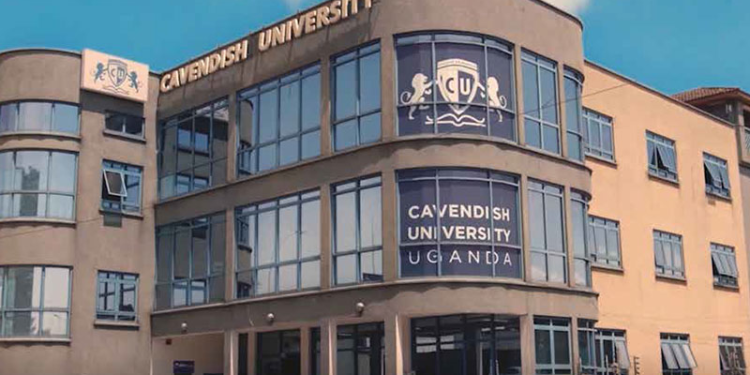By THE OBSERVER UG
High court judge Musa Ssekaana has upheld the indefinite suspension of a Cavendish University student, Atabua Letia Shamil over using foul language.
In his ruling delivered to the parties via email on Friday, Ssekaana further ordered Atabua, a law student who sued the university and its staff, Michael Okopa to pay the institution’s costs of the case. In 2022, Atabua sued the university and Okopa, seeking to quash the decision to indefinitely suspend him without granting him a fair hearing.
He also sought an order for an interim injunction restraining the university from indefinitely suspending him until the disposal of the main application for judicial review. Further, the student sought an order for damages for inconveniences and loss suffered as well as costs of the application. He told court that he had for prolonged periods, raised several complaints about the lecturers’ discriminatory conduct without redress and that on October 5, 2022, he was indefinitely suspended without giving him a right to a fair hearing.
The court heard that the suspension issued by Cavendish was illegal, and irrational and contravened the university regulations embedded in the student’s handbook and all national laws. Atabua asked to be granted the orders in his application saying they are necessary for the dispensation of justice.
In their defense, Cavendish contended that Atabua was enrolled as a student at their faculty of law where he was admitted on an LLB course. While pursuing the course, Atabua had challenges with meeting some of the academic requirements and was required to re-sit some course units after not performing satisfactorily.
The university further told the court that in addition to his poor performance, Atabua also misconducted himself on several occasions and sent to staff offensive emails laced with extremely foul language bringing disrepute. As a result, the university argued that they decided to suspend Atabua on account of his offensive emails to allow him to reflect on his misconduct, reform, and attend a hearing.
However, while on suspension, Atabua issued a notice of intention to sue the university who responded to the letter and assured him that he was to be invited for a hearing before a final decision was taken. The university through an affidavit sworn by David Mutabanura, opposed Atabua’s application also saying it is time-barred, raises no cause of action against them, raises no decision by the respondents to challenge by way of judicial review initiated by him, was premature, and that the respondents are both private persons that cannot be subjected to judicial review proceedings.
In his ruling, Ssekaana dismissed Atabua’s application, saying the circumstances of his case did not require him to be given a hearing before being indefinitely suspended. Ssekaana noted that learning institutions have a wider duty to protect the rest of the students and the university community at large.
According to Ssekaana, this was a temporary corrective action as the investigations were being concluded by the administration or management of the university and therefore, no hearing would have been expected in such circumstances before the conclusion of the investigations.
“The pre-decisional stage should not be made after a hearing and it is only in exceptional circumstances that it can be considered. The right to a hearing may be excluded if prompt action needs to be taken by the administration in the interest of public safety, public health, or public morality, or broadly in the public interest,” said Ssekaana.
To support his decision, Ssekaana ruled that the reason is that the hearing may delay administrative action, thereby defeating the very purpose of taking action in the specific situation.
“The applicant/Atabua was justifiably suspended indefinitely without a hearing due to the nature of the alleged offences of breaching the 1st respondent’s/Cavendish rules and regulations and his continued verbal attacks and insults or use of foul language or offensive and vulgar language to fellow students and university staff,” added Ssekaana.
In his decision, Ssekaana explained that the actions of Atabua did not only constitute a breach of university rules and regulations but is also a criminal offence under the Computer Misuse Act.
“The university management needed to protect the rest of the students from the applicant in the interest of broader public interest to the university community promptly since the applicant/Atabua had become a nuisance and created a toxic university environment with the several abuses and insults to fellow students and university staff,” Ssekaana ruled.
Ssekaana directed Atabua to stop abusing the court process in all his other matters pending before the court, saying that the court process is not an avenue of defaming, insulting, or abusing fellow litigants or judicial officers. He issued the directive after realizing that Atabua also dragged some senior judicial officers in his case whom he didn’t mention and that to some extent, he defamed them which Ssekaana described as unacceptable.
“In the same vein, he used abusive language or derogatory language against the respondents and their counsel in his submissions which this court found to be very derogatory and was advised to have the same removed. The acts of the applicant scandalize the court and are an affront to the integrity of court or court decorum,” said Ssekaana.
In 2021, Ssekaana sent lawyer Male Mabirizi to prison for 18 months for contempt of court saying he had continued to use his social media platforms to attack judicial officers. The sentence came a few weeks after a similar warning.







Discussion about this post